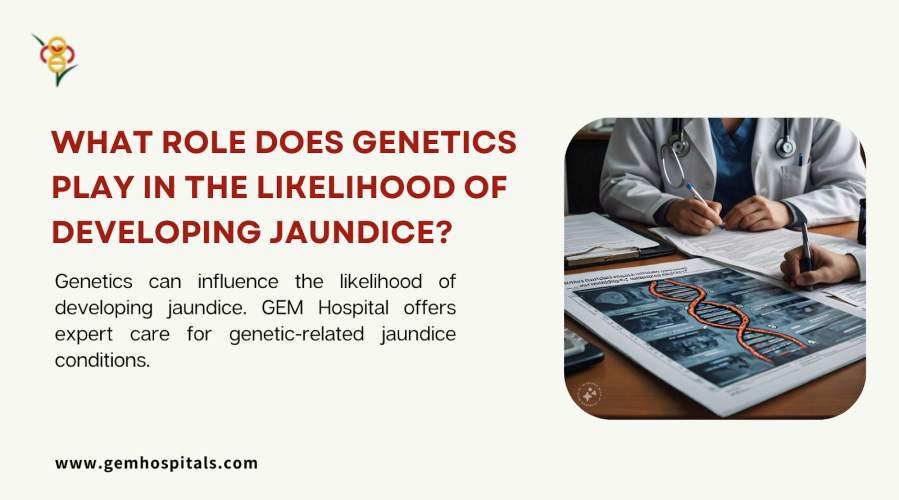Learn effective solutions for digestive problems with expert tips to improve gut health, reduce discomfort, and maintain a healthy digestive system.
What role does genetics play in the likelihood of developing jaundice?

Jaundice is a common well-known condition usually accompanied by yellowing of skin and eyes. The yellowing is due to the presence of a higher amount of bilirubin in the bloodstream, when the bile activity is normal there will be proper excretion of bilirubin out of the body but due to the inability to process bilirubin, it accumulates in the body, and leads to jaundice. With the studies, everyone knows that certain health conditions and environmental factors can bring up the jaundice but what is more interesting is genetics also playing a crucial role in determining an individual’s susceptibility to jaundice. Usually, the genes carried from parents to offspring may carry hereditary information, in that case, certain genetic mutations or inherited conditions may also influence the way the body processes bilirubin, and lead to the development of jaundice. To reveal the unknown facts about the role of genetics in jaundice development keep reading the content below.
Understanding bilirubin metabolism
Before you are to understand the role of genetics in jaundice, it becomes essential to grasp knowledge on how bilirubin is metabolized in the body. Naturally, bilirubin is produced from the breakdown of hemoglobin in red blood cells and undergoes several steps to get eliminated from the body, it may include, unconjugated bilirubin, conjugation, and excretion. If this is the process when there is a disturbance in any of these processes the chance of the development of jaundice may increase. Genetics play an important role in regulating these processes, and mutations or inherited disorders may lead to the risk of jaundice development.
Genetic disorders associated with jaundice
There are several inherited conditions and genetic mutations that are directly or indirectly linked with jaundice development, particularly those that affect the liver’s ability to process bilirubin. Below are some of the genetic disorders that contribute to jaundice,
- Gilbert syndrome is a relatively common genetic disorder caused by a mutation. People with Gilbert syndrome may experience intermittent episodes of mild jaundice, especially during periods of stress, fasting, illness, or dehydration. While the condition is generally benign and doesn’t require treatment, it illustrates the direct influence of genetics on bilirubin metabolism and jaundice risk.
- Crigler-Najjar syndrome is a rare but more severe genetic disorder than Gilbert syndrome. It also involves a particular enzyme deficiency, which is much more profound. There are two types of Crigler-Najjar syndrome which are inherited in an autosomal recessive manner and become the reason for jaundice development.
- Dubin-Johnson syndrome is an inherited disorder caused by mutations. As a result, individuals may develop jaundice, but typically without other liver-related symptoms. This condition is usually benign, and those affected can lead normal lives with minimal health complications.
Genetic predispositions to jaundice in newborns
Genetics also plays a significant role in newborn jaundice, which is common in the first few days of life. Some newborns have genetic variations that affect bilirubin metabolism, making them more prone to developing jaundice.
Like any other factor, your genetical information also going to play a vital role in determining an individual’s likelihood of developing jaundice. Some conditions may affect the metabolism of bilirubin like Gilbert syndrome, Crigler-Najjar syndrome, Dubin-Johnson syndrome, and hereditary spherocytosis these conditions may be inherited from older generations to newer and become the cause of jaundice. Through understanding the genetic factors you can get to know how diagnosing and managing jaundice becomes vital and when your family history has a genetic predisposition you are at higher risk so taking proper care is vital. It is good to consult a specialist they could give hands in early diagnosis or preventing such kind of jaundice in you. For early diagnosis or preventive care, consult the specialists at Gem Hospital.
Contact us today for expert guidance and personalized treatment options!
Blogs & Article
Explore current research trends in digestive health, including new treatments, advanced diagnostics, and innovations improving gut health and patient care.
Discover common digestive health myths and the real facts. Learn simple tips to improve gut health and maintain better digestion for a healthier life.


